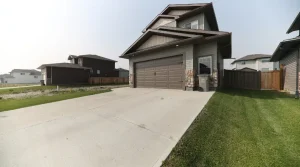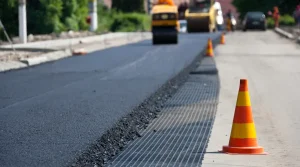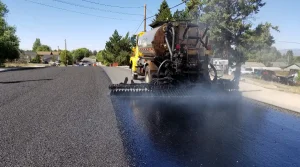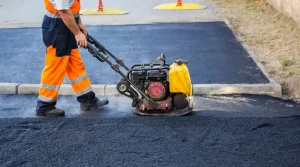A smooth, durable driveway not only elevates the look of your home but also improves access and convenience. Whether you’re a DIY enthusiast or hiring professionals, our guide walks you through every essential step of driveway paving to ensure success.
Key Takeaway:
- A well-paved driveway enhances your home’s curb appeal, increases property value, and ensures long-term functionality.
- Key steps include thorough planning, selecting the right materials, accurate cost estimation, obtaining necessary permits, and prioritizing safety and environmental considerations.
What is the Proper Way to Pave a Driveway?
Paving a driveway isn’t just about laying down asphalt or concrete—it’s a multi-step process requiring careful planning, proper preparation, and precise execution. When done correctly, a paved driveway offers longevity, aesthetic appeal, and added property value. It provides a welcoming entrance and ensures smooth driving for years to come.
Step-by-Step Guide to Paving Your Driveway
1. Accessing Your Driveway
Before starting, inspect your driveway area for potential obstacles such as trees, utility poles, or uneven terrain. Removing these obstructions early simplifies the paving process and prevents costly issues later. Additionally, clear away debris and plan for equipment placement to streamline operations.
2. Calculating the Costs
Budgeting is essential for a successful paving project. Factors to consider include:
- Materials: Asphalt, concrete, gravel, or pavers each come with different costs.
- Labor: Professional services may vary in pricing.
- Tools & Equipment: Renting or purchasing necessary tools.
- Permits: Fees for legal approvals.
- Site Preparation: Costs for excavation, grading, and clearing the area.
Get multiple quotes from paving companies to compare costs and services. Accounting for unexpected expenses helps avoid budget surprises.
3. Measuring the Area
Accurate measurements are vital to determining material quantities and costs. Measure the length and width of the driveway, noting any curves or irregular shapes. Use these measurements to calculate the total square footage, ensuring you order the right amount of materials. Precision in this step prevents costly mistakes down the line.
4. Obtaining Permits
Securing the proper permits ensures compliance with local regulations. Contact your city or town officials to determine specific requirements, which may include:
- Approval for driveway placement.
- Compliance with environmental regulations.
- Ensuring proper distance from roads and property lines.
Failure to obtain permits can result in fines or project delays, so tackle this step early.
5. Choosing Suitable Materials
The material you choose affects the driveway’s appearance, durability, and maintenance needs. Common options include:
- Asphalt: Affordable and flexible, ideal for mild climates.
- Concrete: Durable with low maintenance, perfect for high-traffic areas.
- Gravel: Cost-effective and charming, suited for rural settings.
- Interlocking Pavers: Aesthetic versatility and ease of repair.
Consider factors like local weather, expected traffic, and personal style preferences when selecting materials.
6. Safety and Environmental Considerations
Safety and environmental responsibility are crucial during paving:
- Safety: Use protective gear such as gloves, masks, and safety glasses to prevent injuries.
- Environmental Impact: Dispose of waste responsibly, recycle materials when possible, and comply with local environmental regulations.
Ensuring safety and minimizing environmental harm reflects a responsible approach to home improvement.
7. Preparation for Driveway Paving
Proper preparation ensures a durable and attractive driveway:
- Grading: Ensure the ground is level to prevent water pooling.
- Drainage: Plan for proper water runoff to avoid erosion.
- Landscaping: Adjust surrounding landscaping to integrate seamlessly with the new driveway.
- Clearing the Area: Remove vegetation and debris to create a clean workspace
Frequently Asked Questions (FAQ)
- 1. How long does it take to pave a driveway?
The timeline varies depending on the size and complexity of the project. Typically, it takes 1-3 days for preparation and paving, with additional time for curing if using materials like concrete. - 2. What is the best material for a driveway?
The best material depends on your needs. Asphalt is cost-effective and flexible, concrete offers durability with low maintenance, gravel is inexpensive and rustic, and pavers provide design versatility. - 3. How much does it cost to pave a driveway?
Costs vary based on materials, labor, and site conditions. On average, asphalt driveways cost $3-$7 per square foot, while concrete can range from $4-$10 per square foot. Additional costs may include excavation and permits. - 4. Do I need a permit to pave my driveway?
Yes, most municipalities require permits for driveway paving to ensure compliance with zoning and environmental regulations. Check with local authorities before starting your project. - 5. How long does a paved driveway last?
With proper maintenance, asphalt driveways can last 15-20 years, while concrete driveways may last 25-30 years. Regular sealing and repairs can extend the lifespan of your driveway. - 6. Can I pave my driveway myself?
DIY driveway paving is possible but requires specialized tools and knowledge. If you’re unfamiliar with the process, hiring professionals ensures better results and compliance with local codes. - 7. How do I maintain my paved driveway?
Regular maintenance includes cleaning, sealing (for asphalt), repairing cracks, and addressing drainage issues. Proper care prevents deterioration and extends the life of your driveway. - 8. What should I consider when choosing a paving company?
Look for licensed and insured contractors with positive reviews and experience in driveway paving. Get multiple quotes and ask for references to ensure you’re hiring a reputable company. - 9. What causes cracks in a driveway?
Common causes include poor installation, freeze-thaw cycles, heavy loads, and water infiltration. Using quality materials and proper installation techniques can minimize cracking. - 10. How can I improve the appearance of my driveway?
Consider decorative options like stamped concrete, colored asphalt, or interlocking pavers. Adding borders, landscaping, and lighting can also enhance curb appeal. - .Thorough preparation lays the foundation for a successful project.
Conclusion
Paving your driveway is a valuable investment that enhances both the appearance and functionality of your home. By carefully planning, selecting the right materials, and following each step diligently, you can achieve a driveway that stands the test of time. Whether you’re handling the project yourself or relying on professionals like Hackensack Paving Company, the result will be a beautiful, durable addition to your home.
Transform your driveway into a stunning, functional feature of your home with careful planning and execution. Trust Hackensack Paving Company for professional, reliable paving services that guarantee satisfaction.







